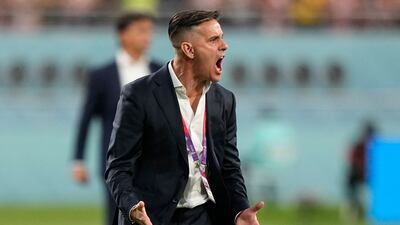Are you dealing with a critic or a cynic? This the key question when it comes to knowing how to handle the feedback you might receive when on an endeavour – business or personal – according to Deepak Chopra, the well-being expert and medical doctor.
“There's a difference between critics and cynics. A critic says ‘Show me’. Cynics don’t even want to be shown,” Dr Chopra told me last week on the The National’s Business Extra podcast.
These days, with so much noise around us, all the time, it is especially important to stop and ask the question: cynic or critic?
Trust has been eroded and cynicism is rampant – understandably, given the false narratives we have experienced going back to the 2003 US-led invasion of Iraq and through the financial crisis of 2008-2009 and Brexit in 2016.
What should leaders then do? Especially as it seems as if people don’t care if you might be right, only that you validate their feelings and concerns.
The 2022 Fifa World Cup in Qatar offers instruction and is a fitting arena to observe the premise there is a line between criticism and cynicism. Nothing draws opprobrium and praise quite like elite competitive sport presented on a global stage. During the group stages, there have been plenty of flashpoints between competitors – even off the pitch – both before and after games have been played.
After their 4-1 win over Canada, Croatia coach Zlatko Dalic said his Canadian counterpart John Herdman refused to shake hands, for example. Gareth Southgate told his England players to ignore the boos following a 0-0 draw against the USA. And Iran's national team coach Carlos Queiroz and Jurgen Klinsmann have had a public argument in the media over comments by German football legend about the footballing culture of Iran and central American countries. Much of this discourse is counter-productive for all involved.
Dalic said of Herdman: “I did not see the other head coach after the match. Whether I lose or win, I always congratulate the other head coach. He wasn’t there and that’s his way of doing things. He’s obviously mad. He is a good coach, he is a high-quality professional, but it will take some time for him to learn some things.”

Pre-match Herdman had claimed his team would beat Croatia. After the loss he was a little less emotional.
“I could have been a little more composed coming out of the huddle. That is my learning. I will take that on the chin.”
Three very different approaches there; Dalic waiting for the upper hand before responding; Southgate shutting out the noise; Queroz going on the offensive. Which works best?
“If you are convinced, and you have the expertise, then you have to be immune to criticism, but still responsive to feedback, which means don't get personally offended,“ Dr Chopra advised.
Ultimately, Iran lost to the US and were out of the tournament. England went on to win their next match against Wales.
There was an emotional aspect in the build up to the Iran-USA game, which may have created extra pressure. It is the emotion related to criticism, which is the most difficult aspect to step away from. Dr Chopra said that being able to recognise this can be the difference between a productive and counter-productive experience.
“I realised that if I was going to respond to critics, I would be offended for the rest of my life. I didn't want to live like that,” he said.
As we head into 2023, the noise will only grow as issues beyond competitive sport such as policy on climate action, human rights, public health, the economy, censorship, job creation and diversity take on even more urgency. At the World Cup, we are reaching the stage when every match is a must-win. In everything else in life now, the stakes are even higher. How should leaders, executives and entrepreneurs handle this charged atmosphere? How should those looking to make things better respond?
After all, criticism – internal and external – can be valuable. No one can make progress in a bubble.
“I still heard them…I heard them for their feedback,” Dr Chopra said.
However, it can be a bitter lesson when your criticism (or cynicism) comes back to bite you, as coach Herdman experienced.
Dr Chopra suggested: “Don't be cynical, be sceptical. That's a good thing. Science is based on scepticism. And so is philosophy.”
There is a larger warning for individuals though.
“Cynical mistrust is the number one risk factor psychologically for premature death from cardiovascular disease,” Dr Chopra said.


